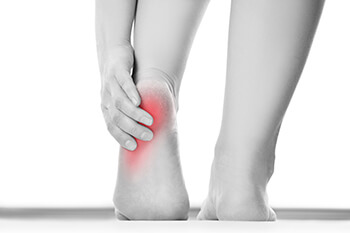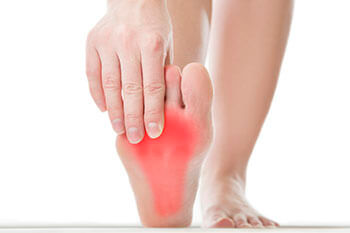Heel Pain

Heel pain, while quite common, can be extremely uncomfortable and painful if not met with proper care or treatment. Heel pain may occur if you injure or overuse the heel. If left uncared for, the affected area may worsen, limiting your mobility and making it difficult to perform everyday activities, such as walking.
There are many different causes of heel pain, including strains or sprains, tarsal tunnel syndrome, stress fractures, Achilles tendonitis, and heel bursitis. One of the most common causes of heel pain for children and teenagers specifically is Sever’s disease. Sever’s disease can develop due to overuse or repetitive microtrauma of the heel bone's growth plates. This condition is often seen among those who are active in sporting activities.
Other causes of heel pain may include issues with poor circulation, poor posture when walking or running, a soft tissue mass, and a rupture of the Achilles tendon. To help ease the discomfort of heel pain, it’s advised that you get plenty of rest, apply ice to the affected area, and wear shoes that fit properly. In some more serious cases, a chiropodist might recommend the use of custom orthotics or shoe inserts for extra support.
If you’re experiencing heel pain, we recommend you consult with a chiropodist as soon as possible for a proper diagnosis and treatment plan.
Plantar Fasciitis

Plantar fasciitis affects the plantar regions of the foot, namely the heel, arch, and midfoot. When too much stress is put on the plantar fascia, or the connective tissue that stretches from the heel to the ball of your foot, inflammation, overtightening, and tearing may arise. This can cause foot pain. Because of plantar fasciitis, you may experience tearing with the first steps you take in the morning each day.
A certain trigger that may cause stress to the plantar fascia includes poor arch support, which is brought upon by frequently walking barefoot or wearing shoes with improper arch support. Other causes include obesity or a sudden increase in weight, increased physical activity, weak foot and ankle muscles, tight calf muscles, and arthritis.
If you’re feeling pain after sitting, walking, or standing for a long period of time, as well as when you first step out of bed or climb stairs, you may be showing signs of plantar fasciitis. To know for sure what’s causing you pain, it’s best that you get an x-ray taken of your foot.
Because plantar fasciitis is known to worsen over time, it’s recommended that you meet with a chiropodist as soon as possible for a proper diagnosis and advised treatment plan.
